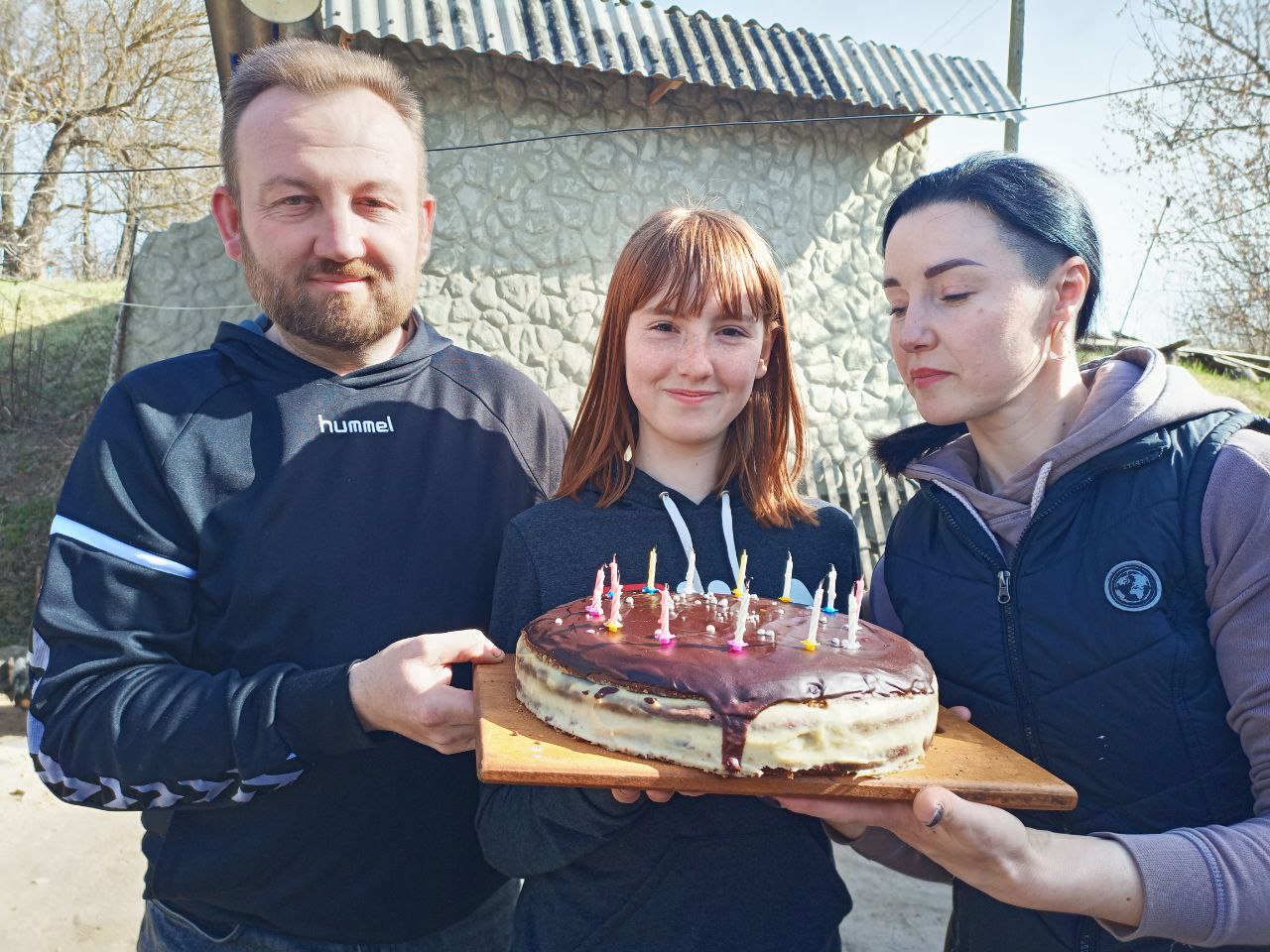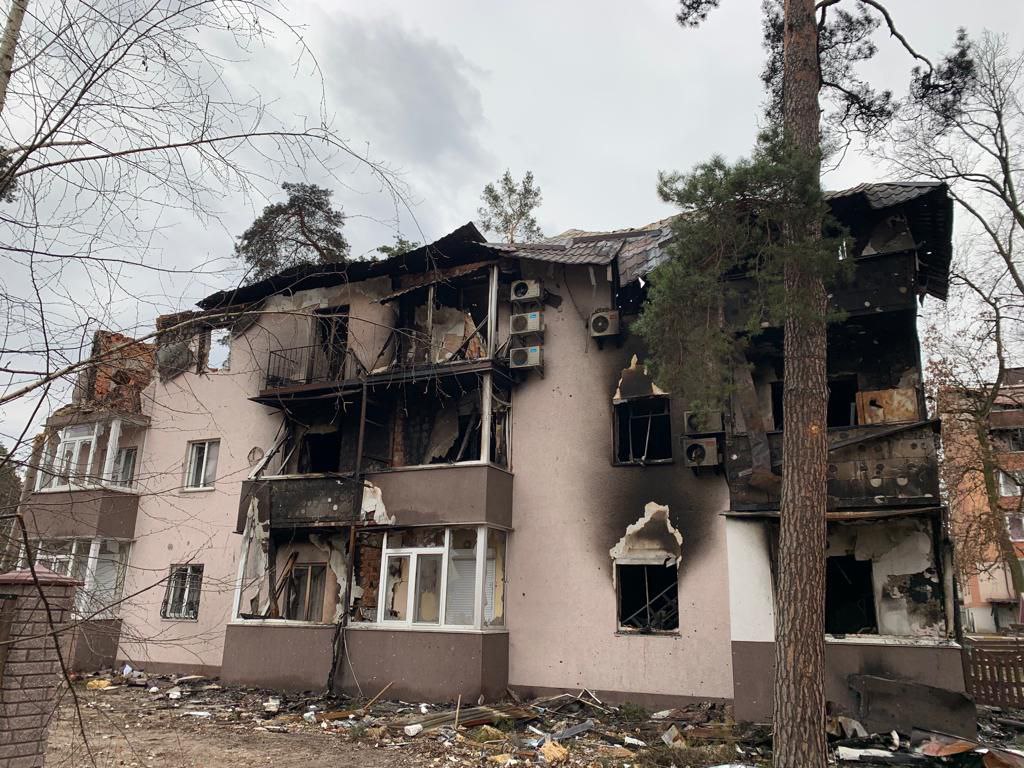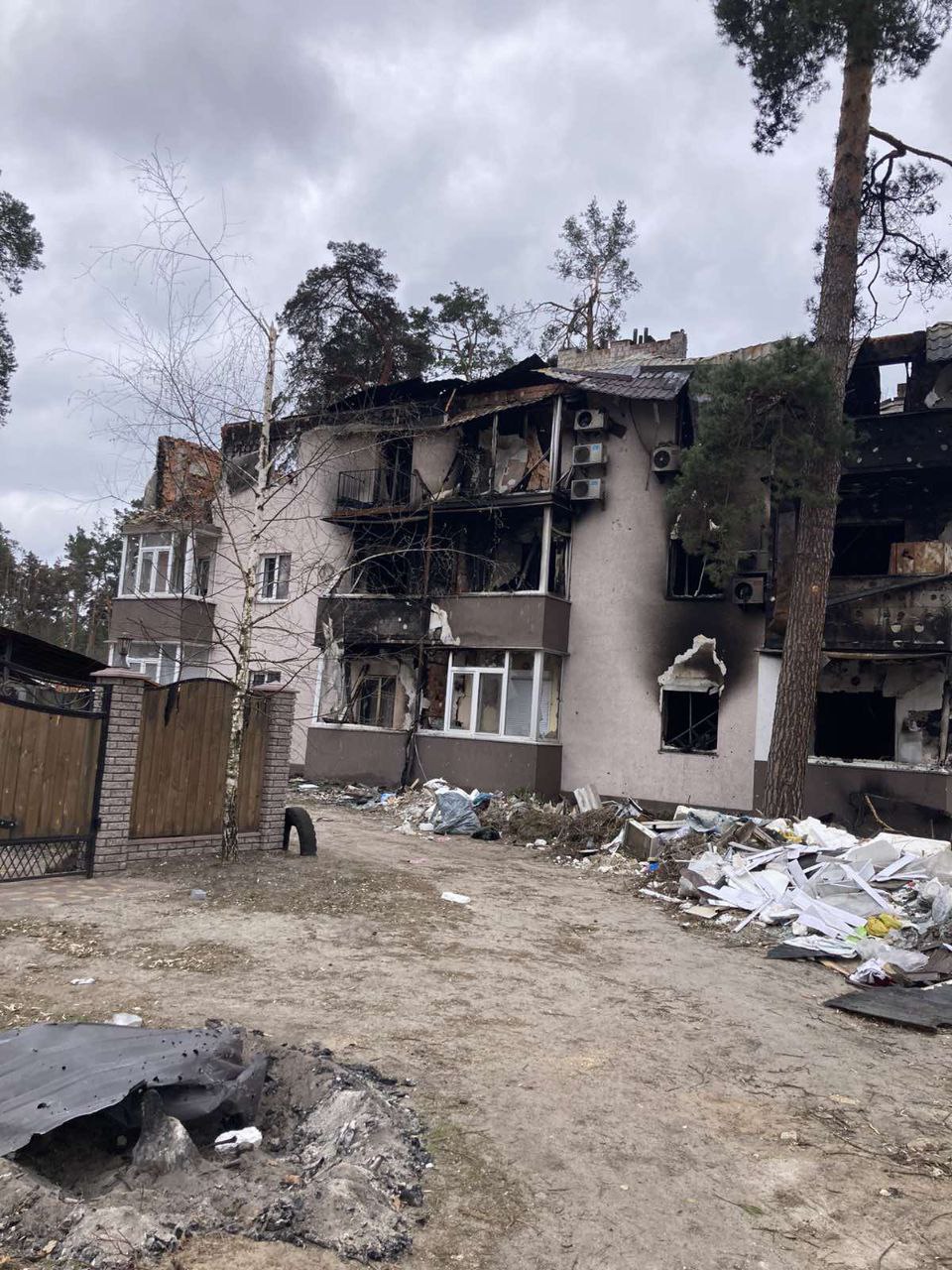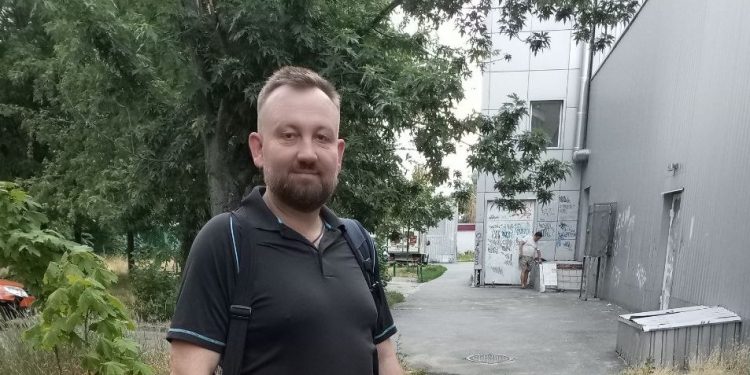Ivan Leonov, the head of the news section at Ukraina Moloda newspaper, along with his family, left Irpin amidst mortar shelling. His daughters, carrying a cat, bravely endured the swift and challenging escape. Later, the world will learn about this city and the crimes committed there by Russian occupiers and will shudder in horror. Ivan’s wife will lose both peace and sleep for a long time.
“There was mortar shelling, and people stood under the bridge.”
Before the full-scale invasion, Ivan Leonov’s family lived in Irpin in an apartment building. A cozy courtyard: a green lawn in the yard, a rose bush peeking through the window, and a barbecue grill. The apartment was neat and modern. Ivan and his wife worked their entire lives to ensure comfort for themselves and their two daughters. But now, all that remains of their home is ashes.
— What can I say, when the ceiling collapsed, bricks were scattered… And the rain flooded everything… Only some dishes remained from our previous life, — Ivan shares.
The family learned about their loss during the evacuation. The Leonovs family managed to escape Irpin in March – they jumped on the “last train.”
— We left on the 4th of March in the morning, — the journalist recalls those dreadful days. — The next day, many of our acquaintances and relatives ended up in the famous photo of people standing under the bridge during the mortar shelling. On the day we were leaving, Poltavska Street turned into a sea of people. We could only take one backpack each… Our daughter carried the cat in a sports bag. We were walking, and not far beyond the quarry, there were tank salvos and mortar shelling not far beyond the quarry. We heard everything. But at that time, the children endured everything stoically – it showed later.

After what they experienced, Ivan’s daughter couldn’t sleep properly, even during the evacuation. She would wake up every night, screaming, “Let’s run away! I’m scared!” Later, Ivan learned that they were fortunate to leave in time. The volunteer driving their evacuation bus returned to Irpin on the following day, March 5th, and tragically, on the 6th, he lost his life while helping people cross a river under a bridge. He perished alongside his wife and child, whom he was trying to save. Ivan documented the heroic acts of these individuals daily in his publication. He worked as an editor for the website Ukraina Moloda and didn’t stop working for even a day. He continued publishing news even from a basement, where he, along with his family, sought shelter from the shelling during the early days of the war.
— Even under such conditions and with poor communication, we had to continue working – providing our readers with up-to-date information about the war. The print version of the newspaper didn’t come out until around mid-April. But since I work on the website, the news feed never stopped, — recalls Ivan about those days. — There were even moments when Russian hackers targeted us: they wanted to silence the truth – they ‘hacked’ our site and posted announcements like ‘drop your weapons.’ But we quickly debunked those fake news pieces they were spreading and wrote about what was really happening.
“In our apartment building’s chat, they posted a photo: I saw it, and it hit me hard. I realized that we had nothing left…”
Even when the family finally reached a relatively safe place, the situation didn’t become any less distressing. Ivan’s wife still recalls those times with tears in her eyes.
— I couldn’t let go of my phone even in the middle of the night. I was thinking about our little house – I hoped it would stand even if it got looted. Every day, I searched for photos of our home to reassure myself that it was okay. But then the day came when they posted a photo in the building’s chat, showing what was left of it… I saw it, and I was overwhelmed… We realized that we had nothing left… We left with only the clothes on our backs and a couple of backpacks. That’s all that remained from our pre-war life, — says Ivan’s wife, Natalia.
She still grieves and sheds tears whenever she thinks about her apartment. Everything was burned down, as no one could extinguish the fire due to constant shelling preventing the firefighters from working. The building is slated for demolition, as it cannot be restored like many others in Irpin. In the fire, not only furniture, clothing, and appliances were lost, but the flames consumed cherished memories.

— All my writings, archives, cameras, and dictaphones were burned. But what hurts the most are two hard drives. One was a system disk from my desktop computer with a photo archive containing my foreign and domestic journalistic assignments. And the laptop with our family photo archive burned down. What’s left partially is just about 5% of the entire archive. Possessions can be replaced, but memories…— the journalist sighs sadly.
The Russian occupiers left the Leonov family without a home, their daughters without a happy childhood, and their youth without their beloved school. Irpin Lyceum No. 3, where the eldest daughter graduated and the younger one was studying, was destroyed by the enemy. This school suffered perhaps the most in the region. It was hit directly, damaging both the building and the adjacent areas.

“What’s the point of sitting amidst the ashes and grieving?”
Now the family is learning to start anew. Ivan continues to work at the publication Ukraina Moloda. They have moved to a district in Kyiv, choosing one not far from their beloved Irpin. Ivan believes that Ukraine will be able to achieve compensation from the terrorist country for everyone who suffered from the Russian aggression. But for now, they must live on and not give up.
— We need to reboot. We are starting from scratch. What’s the point of sitting amidst the ashes and grieving? We need to work and strive for victory. A rolling stone gathers no moss,— journalist Ivan Leonov summarizes.
This article tells the story of journalist Ivan Leonov and his family’s harrowing escape from Irpin, Ukraine, during the Russian invasion. Fleeing amidst mortar shelling, the family endured challenging conditions, with their daughters and even a pet cat bravely facing the dangers. Ivan documented their escape and continued reporting despite the hardships. They left their home behind, which was eventually destroyed by the conflict. Ivan’s wife suffered sleepless nights due to the traumatic experience, and their daughter’s distress continued even after their evacuation. Despite losing everything, including cherished memories, the family is focused on rebuilding and contributing to Ukraine’s recovery.
This series, titled Executed Free Speech, is created as part of a project Drawing Ukrainian And International Audience’s Attention To Serious Violations Of Human Rights And Crimes Against Journalists And Mass Media By The Russian Federation, which is performed by the National Union of Journalists of Ukraine, with support from the Swedish non-profit organization Civil Rights Defenders.
JOURNALISTS ARE IMPORTANT. Stories of Life and Work in Conditions of War is a cycle of materials prepared by the team of the NUJU with the support of the Swedish human rights organization Civil Rights Defenders.
#CRD

 THE NATIONAL UNION OF
JOURNALISTS OF UKRAINE
THE NATIONAL UNION OF
JOURNALISTS OF UKRAINE
















Discussion about this post